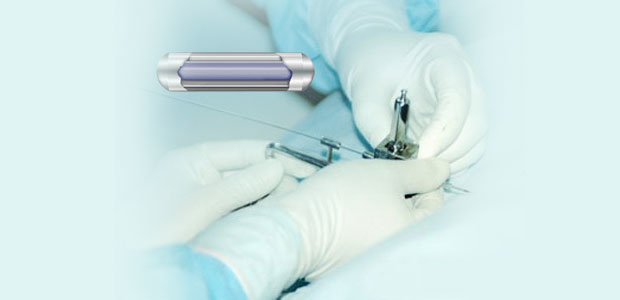
1. Definition
Under the guidance of CT or B-mode Ultrasound, radioactive particle and chemical particle will be implanted into the tumor in turn so that it can realize the synchronization of radiotherapy and chemotherapy. This technology is convenient, safe, minimally invasive and low incidence of complication. It is one of the best therapies for cancer patients at advanced stage.
2. How do Radiotherapy Particle and Chemotherapy Particle Take Effects?
Modern Cancer Hospital Guangzhou applied 125I seeds as radioactive particles that can give off short-range γ-ray to kill tumor cells continuously. 125I seed implantation can achieve the same internal radiation effects as surgery does and have little complication and few side-effects. The half-life period of 125I seed is 60.1 days. As the radiological dose gradually decrease, 125I seed can effectively exposure up to 180 days in body since it is planted.
Chemical particle, also called interstitial chemotherapy, is to put anticancer medicine to load on degradable or non-degradable excipient so that they can build up a drug delivery system. The carriers are natural macromolecule material or synthetic macromolecule material. Chemical particle is implanted into tumor tissue and tumor bed, which is in interstitial substance of tumor cycle or after excision. Research shows that if the effective anticancer medicine is implanted in a part of a solid tumor or neoplastic lesion in serosa, even nearby the normal tissue, the part of tumor will stay at high concentration of medicine, which is largely higher than the concentration of blood body circulation, in the period of medicine diffusion. It usually lasts two to fifteen days and takes effect on killing cancer cells and controlling the partial lesion.
The implanted chemical particle, as the supplement of radiotherapy, not only kills the cancer cells with high dose of medicine as the interventional therapy does, but also takes sensitization effect on radioactive particle and reinforces the efficacy of radiotherapy.
3. Procedure
Radioactive Particle and Chemical Particle Combined Implantation is that the radioactive particle and chemical particle will be implanted in turn by percutaneous puncture into the tumor or near the tumor. This therapy is safe and with easy procedure, small trauma and little complication.
4. The Advantages of Radioactive Particle and Chemical Particle Combined Implantation
1) Chemical particle diffuses in some area so that cells of a large area can get to the high-concentration chemotherapy medicine and make up the mistakes for insufficient initial dose of radiotherapy particles.
2) Chemical particle takes long effect on some parts and has high-concentration impulse therapy to tumor tissue. Also, it can maintain effective concentration for a long time and restrain invasion and metastasis of small cancer cells. Chemical particle through lymph flows to lesion so that it can effectively prevent metastasis of lymph.
3) Radioactive particle and chemical particle take dual effects on anticancer and increase the control rate of tumor.
4) The jointed application of radioactive particle and chemical particle makes chemotherapy medicine take sensitization effect of radiotherapy and strengthen the anticancer efficacy.
5) Though chemical particle, as well as the radioactive particle, generates high-concentration medicine partially, there are a small amount of them that can get into the blood circulation and at slow speed so comparing to the same dose of general chemotherapy, the side-effect of chemical particle is in lower rate and lower degree.
6) Radioactive particle and chemical particle are implanted at the same time so that it can take one surgery and get dual effects without extra surgery procedure.
5. Indication
Radioactive Particle and Chemical Particle Combined Implantation is used to treat many kinds of primary cancers and cancer metastasis, such as head-neck cancer, breast cancer, prostate cancer, lung cancer, liver cancer, kidney cancer, cervical cancer and other solid tumor. This technology gets good efficacy.
6. The Number of Particle
The number of particle depends on the sizes of cancer lesion. The bigger the tumor it is, the more particles of radiotherapy and chemotherapy it need. During review check, if there are not enough particles, patients need to be implanted more.













 viber
viber